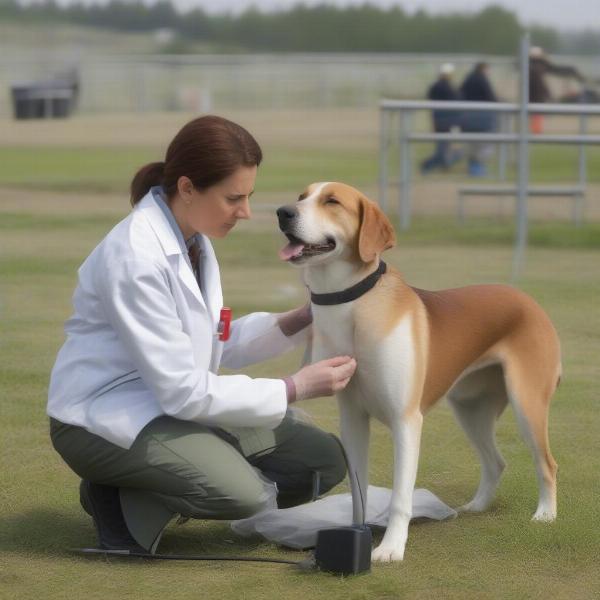Field trial dog food plays a crucial role in the performance and overall health of working dogs, especially those participating in demanding field trials. These competitions require dogs to be at peak physical condition, exhibiting endurance, strength, and focus. Choosing the right field trial dog food can significantly impact a dog’s ability to succeed. This article dives into the essential aspects of field trial dog food, helping you understand how to choose the best option for your hardworking canine companion.
What Makes Field Trial Dog Food Different?
Field trial dog food is formulated to meet the unique nutritional needs of highly active dogs. Compared to regular dog food, it typically contains higher levels of protein and fat to provide sustained energy for long days in the field. This is crucial for maintaining muscle mass and providing the fuel needed for intense activity. Furthermore, these specialized formulas often include added vitamins and minerals to support joint health, immune function, and overall well-being.
Key Nutrients in Field Trial Dog Food
Understanding the key nutrients in field trial dog food helps you make an informed choice:
- Protein: Provides the building blocks for muscle repair and growth. Look for sources like chicken, beef, lamb, and fish.
- Fat: The primary energy source for working dogs. Healthy fats like those found in fish oil and poultry fat are ideal.
- Carbohydrates: Provide quick energy. Look for complex carbohydrates from sources like brown rice and sweet potatoes.
- Vitamins & Minerals: Essential for overall health and supporting bodily functions. Common additions include glucosamine and chondroitin for joint health.
Choosing the Right Field Trial Dog Food for Your Dog
With numerous options available, selecting the appropriate field trial dog food can be daunting. Consider these factors:
- Activity Level: How often and how intensely does your dog work? Adjust the calorie density accordingly.
- Age and Breed: Puppies and senior dogs have different nutritional requirements. Certain breeds may also have specific needs.
- Digestibility: High-quality ingredients are easier to digest, minimizing digestive upsets.
- Ingredients: Look for whole meat sources and avoid artificial flavors, colors, and preservatives.
Considering Your Dog’s Specific Needs
Every dog is an individual, and what works for one might not work for another.  A veterinarian examining a field trial dog. Consulting with your veterinarian can help you determine the ideal food for your dog’s specific needs. They can assess your dog’s health, activity level, and any potential dietary sensitivities. field and trial dog food
A veterinarian examining a field trial dog. Consulting with your veterinarian can help you determine the ideal food for your dog’s specific needs. They can assess your dog’s health, activity level, and any potential dietary sensitivities. field and trial dog food
Feeding Guidelines for Field Trial Dogs
While the specific feeding guidelines will vary depending on the brand and your dog’s individual needs, some general principles apply:
- Frequency: Most adult field trial dogs benefit from two meals per day.
- Portion Control: Follow the manufacturer’s recommendations as a starting point and adjust based on your dog’s weight and activity level.
- Hydration: Ensure your dog always has access to fresh water, especially during and after exercise.
- Gradual Transitions: When switching to a new food, gradually introduce it over several days to avoid digestive issues.
Monitoring Your Dog’s Response to Field Trial Dog Food
Pay close attention to your dog’s condition after switching to a new field trial dog food. Monitor their energy levels, coat condition, stool quality, and overall health. If you notice any adverse reactions, consult your veterinarian.
Conclusion
Choosing the right field trial dog food is an investment in your canine athlete’s performance and well-being. By understanding the key nutrients, considering your dog’s individual needs, and monitoring their response to the food, you can ensure they have the energy and stamina to excel in their field trials. coon dog festival saluda nc
FAQ
-
What is the difference between field trial dog food and regular dog food? Field trial dog food typically has higher protein and fat content to fuel high-energy activities.
-
How much field trial dog food should I feed my dog? Follow the manufacturer’s guidelines and adjust based on your dog’s weight and activity level.
-
Can I feed puppies field trial dog food? Puppies have different nutritional needs. Consult your veterinarian for recommendations. skinners dog food review
-
What are the signs that my dog is not tolerating their field trial dog food? Look for signs like digestive upset, skin issues, or changes in energy levels.
-
How often should I switch my dog’s field trial dog food? If your dog is thriving on a particular food, there’s no need to switch frequently.
-
Are there any specific ingredients to avoid in field trial dog food? Artificial colors, flavors, and preservatives are generally best avoided. brittany dog puppies for sale uk
-
What should I do if my dog has allergies or sensitivities? Consult your veterinarian to determine the best food for your dog’s specific needs. huntaway dogs
About ILM Dog
ILM Dog is your trusted international resource for expert dog care advice. We provide practical and reliable information on breed selection, health care, training, nutrition, grooming, and accessories, catering to both new and experienced dog owners worldwide. We help you navigate the wonderful world of dog ownership with confidence, ensuring your furry friend lives a happy, healthy, and fulfilling life. For expert advice and tailored recommendations, contact us at [email protected] or call +44 20-3965-8624. Visit ILM Dog today!